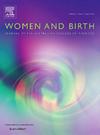助产士对新毕业生支持的看法:一项比较提供连续性护理的助产士与其他护理模式助产士支持的调查
IF 4.1
2区 医学
Q1 NURSING
引用次数: 0
摘要
目前尚不清楚毕业生助产士是否从提供连续性护理的助产士和不从事连续性模式工作的助产士那里得到类似的支持。所有新毕业的助产士都需要支持,因为他们从学生过渡到从业者,无论他们工作的护理模式如何。新毕业的助产士热衷于在护理模式的连续性中工作,但需要良好的指导。目的比较在连续性护理模式下工作的助产士和不在连续性护理模式下工作的助产士对新毕业生提供支持的看法。方法采用在线调查的横断面研究设计。定量分析包括描述性统计和独立t检验。开放式问题数据采用内容分析。两组助产士都表示,对应届毕业生来说,掌握知识并继续终身学习很重要。两组助产士还报告了新毕业生参与决策的重要性。在连续性护理模式下工作的助产士更有可能成为自我护理理想行为的榜样,提供支持性环境,并认为新毕业生应该有更多机会在工作量减少的情况下从事连续性护理工作,而不是在连续性模式下的助产士。结论助产士认为倾听新毕业生的意见并重视他们的意见是护理工作的重要组成部分。指导和支持新毕业生的持续教育支持和包容性对所有人都很重要,无论护理模式如何。本文章由计算机程序翻译,如有差异,请以英文原文为准。
Midwives' perceptions of support for new graduates: A survey that compared support from midwives who provide continuity of care with midwives from other models of care
Problem
It is unknown if graduate midwives receive similar support from midwives providing continuity of care and midwives not working in continuity models.
Background
All new graduate midwives require support as they transition from student to practitioner regardless of model of care in which they work. New graduate midwives are keen to work in continuity of care models but require good mentorship.
Aim
To compare the perceptions of support provided by midwives to new graduates between those working in continuity of care models and those not working in those models.
Methods
A cross-sectional study design with an online survey was undertaken. Quantitative analyses included descriptive statistics and independent t-tests. Content analysis was used for the open-ended questions data.
Findings
Both groups of midwives reported it was important for new graduates to have knowledge and continue lifelong learning. Both groups of midwives also reported the importance of new graduates being involved in decision-making. Midwives working in continuity of care models were more likely to role model desirable behaviours of self-care, provide supportive environments, and think that new graduates should have more opportunities to work in continuity of care with a reduced workload than midwives not in continuity models.
Conclusion
Midwives thought that it was important to listen to new graduates’ opinions and to value their opinions as an integral part of care. Mentoring and supporting new graduates with ongoing educational support and being inclusive is important for all regardless of model of care.
求助全文
通过发布文献求助,成功后即可免费获取论文全文。
去求助
来源期刊

Women and Birth
NURSING-OBSTETRICS & GYNECOLOGY
CiteScore
7.20
自引率
13.20%
发文量
371
审稿时长
27 days
期刊介绍:
Women and Birth is the official journal of the Australian College of Midwives (ACM). It is a midwifery journal that publishes on all matters that affect women and birth, from pre-conceptual counselling, through pregnancy, birth, and the first six weeks postnatal. All papers accepted will draw from and contribute to the relevant contemporary research, policy and/or theoretical literature. We seek research papers, quality assurances papers (with ethical approval) discussion papers, clinical practice papers, case studies and original literature reviews.
Our women-centred focus is inclusive of the family, fetus and newborn, both well and sick, and covers both healthy and complex pregnancies and births. The journal seeks papers that take a woman-centred focus on maternity services, epidemiology, primary health care, reproductive psycho/physiology, midwifery practice, theory, research, education, management and leadership. We also seek relevant papers on maternal mental health and neonatal well-being, natural and complementary therapies, local, national and international policy, management, politics, economics and societal and cultural issues as they affect childbearing women and their families. Topics may include, where appropriate, neonatal care, child and family health, women’s health, related to pregnancy, birth and the postpartum, including lactation. Interprofessional papers relevant to midwifery are welcome. Articles are double blind peer-reviewed, primarily by experts in the field of the submitted work.
 求助内容:
求助内容: 应助结果提醒方式:
应助结果提醒方式:


